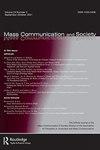Theorizing Connective Democracy: A New Way to Bridge Political Divides
IF 2.7
2区 文学
Q1 COMMUNICATION
引用次数: 4
Abstract
ABSTRACT This two-study package theorizes connective democracy as a means of enabling the type of democratic discourse envisioned by deliberative democracy in highly polarized political climates. Using survey data (N = 1,160) and follow-up interviews with survey respondents (n = 56), we theorize connective democracy. We argue that connective democracy offers a less sanitized view of democracy than deliberative democracy where not all types of polarization are equally damaging to democracy. Further, connective democracy prioritizes cross-cutting political conversations and focuses on shared humanity and genuinely listening to divergent points of view. In essence, connective democracy provides a path forward to forge connections between people, thus providing a boundary condition for deliberative democracy. Our findings explore how the public enacts connective democracy, and the role of the professional news media in that enactment. Theoretical implications are discussed in light of recent concerns about affective polarization as well as deliberative democracy’s feasibility.联结民主理论化:弥合政治分歧的新途径
这两项研究将关联民主理论化,作为在高度两极化的政治气候中实现协商民主所设想的民主话语类型的一种手段。利用调查数据(N = 1,160)和对调查受访者的后续访谈(N = 56),我们将关联民主理论化。我们认为,与协商民主相比,结缔性民主提供了一种不那么干净的民主观,在协商民主中,并非所有类型的两极分化都对民主造成同样的损害。此外,关联民主优先考虑跨领域的政治对话,关注共同的人性和真正倾听不同的观点。从本质上讲,关联民主为人与人之间建立联系提供了一条前进的道路,从而为协商民主提供了边界条件。我们的研究结果探讨了公众如何制定关联民主,以及专业新闻媒体在该制定中的作用。根据最近对情感两极分化的关注以及协商民主的可行性,讨论了理论含义。
本文章由计算机程序翻译,如有差异,请以英文原文为准。
求助全文
约1分钟内获得全文
求助全文
来源期刊

Mass Communication and Society
COMMUNICATION-
CiteScore
6.90
自引率
3.30%
发文量
58
期刊介绍:
Mass Communication and Society" mission is to publish articles from a wide variety of perspectives and approaches that advance mass communication theory, especially at the societal or macrosocial level. It draws heavily from many other disciplines, including sociology, psychology, anthropology, philosophy, law, and history. Methodologically, journal articles employ qualitative and quantitative methods, survey research, ethnography, laboratory experiments, historical methods, and legal analysis.
 求助内容:
求助内容: 应助结果提醒方式:
应助结果提醒方式:


